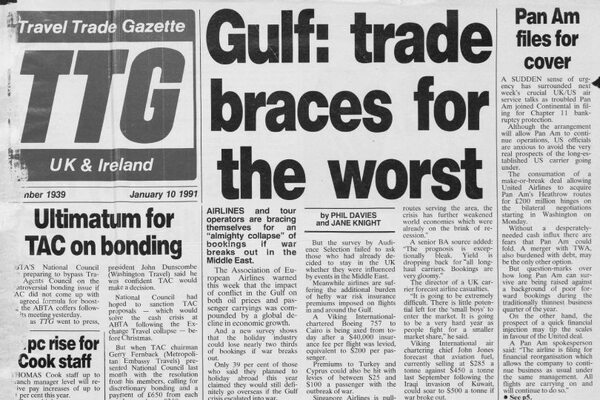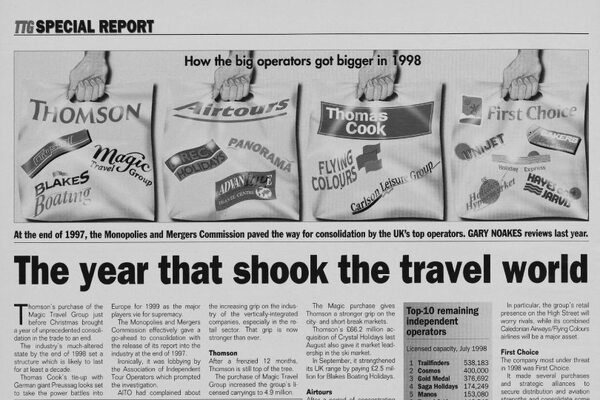TTG at 70: The 90s – the decade that just about saw it all
 Gary Noakes
Gary NoakesThe 1990s was to prove the most tumultuous decade since the birth of the modern mass travel industry, with the first Gulf War precipitating the collapse of the market – and new winners emerging once the dust settled.
The US-led action after Iraq invaded Kuwait threatened world oil supplies and coincided with UK interest rates rising to double figures. The fallout cost the industry £561 million after the CAA predicted some three million package holidays were under threat.
UK giant International Leisure Group (ILG), which owned Intasun, fell soon afterwards. Its failure was blamed on the collapse of in-house airline Air Europe, with debts put at £370 million.
The Gulf War ended in 1991 and as business picked up, so began the scramble to replace ILG. Airtours, which started as a one-branch travel agency in Lancashire, came to the fore, briefly overtaking Thomson as market leader by piling it high and selling it cheap.
Airtours launched an airline to fill a gap in the charter market, aiming to carry 60% of its own clients. It also bought agency Pickfords Travel plus many operators, and brought budget cruising to the UK. Thomson also entered cruising in 1995, using a 38-year-old vessel once written off after running aground.
Airtours then began acquiring operators in Europe and North America, but really launched onto the world stage when Carnival took a minority stake in 1996.
Thomas Cook, meanwhile, found a new parent company in German tour operating giant LTU. TTG described the £200-million plus price tag a “bargain” for a travel company “trying to exploit the single European market of 1993”.
Cook was later derided for a £6 million rebranding exercise which saw its tour operation become JMC – after founder’s son John Mason Cook – which only served to distance itself from what was then the most famous name in travel.
Corporate battles continued in the 90s, with Airtours twice unsuccessfully bidding for main rival Owners Abroad (later First Choice). Airtours also bought Hogg Robinson’s agencies, combining them with Pickfords’ to create the 548-branch Going Places chain.
The 90s also saw operators launch programmes further in advance, with Thomas Cook head of marketing Dido Harding condemning it, stating: “To bring out brochures in June, when people have still not booked this year’s holiday, would be madness.”
As the decade wore on and the big companies grew bigger, the Office of Fair Trading and the Monopolies and Mergers Commission (MMC) examined the practice of big agency chains selling overpriced insurance in return for discounts on packages and outlawed it.
The MMC also looked at whether the industry was too concentrated among a small number of big operators, telling them they could no longer dictate discount levels to agencies. Agency ownership also had to be made more transparent.
On the airline side, the decade saw Heathrow, which British Airways regarded as its fortress, opened to competition. It sounds unbelievable today, but American Airlines and United had been banned from flying there, as was another BA competitor, the fledgling Virgin Atlantic, but this all changed in 1991.
The same year saw Stansted open its new terminal with a small carrier, Ryanair, among its first customers. Six years later, Ryanair enraged the trade by cutting commission from 9% to 7.5%.
In the late 90s, BA sought to counter easyJet by launching its own low-cost direct-sell airline, Go. It was well received by consumers, but BA decided no-frills flying was not its market and sold Go, ironically, to easyJet.
The decade also saw the European package travel directive introduced and Abta abolish its Stabiliser closed shop agreement in the face of a legal challenge by the government. This ended the requirement for Abta membership to sell Abta members’ products.
Meanwhile, 12 operator collapses in 1996/97 cost the Air Travel Trust Fund £4.5 million, with the CAA telling the government it had to borrow £11 million to top up the pot. Another milestone was the opening of the Channel Tunnel in 1994.
None of these events, though, were to surpass the decade’s biggest revolution – the emergence of the internet. Agencies like Scotland’s AT Mays unveiled websites few knew how to use, while Microsoft began talks with airlines about launching a cyber travel agency. Its head of travel told TTG: “Distribution is the last bastion of cost reduction as yet unchallenged.”
The decade ended with talk of the Millennium Bug, which threatened to cause havoc with computers as the clocks ticked into the new century. While fears were unfounded, there were lots of new year bargain breaks to be had.
What did it all mean?
If a film was made about the travel industry, it would be set in the 90s. The decade saw it all; war, a massive failure, and an upstart underdog that sprang from a shop in Lancashire into a multibillion-pound brand thanks to a government investigation that gave the green light to dozens of acquisitions.
New destinations also emerged, with the first charter flights to Cuba and the Caymans, budget cruising began and hundreds of high street agencies popped up. There was also the building of a tunnel under the Channel and the grand finale, the birth of the internet. Phew!
TTG at 70: Opening up the archives
During our 70th anniversary year (2023), TTG charted the history of the travel industry through a series of special features delving into the magazine's 70-year back catalogue, all of which is archived on the TTG Media website. Here is the story so far:
- How travel took on the Covid crisis – and won
- The long journey to package holiday perfection
- How travel agents have stood the test of time
- The extraordinary rise of the cruise industry
- Aviation's highs and lows through the ages
- The ash cloud, the rise of cruise – and the death of an institution
- How – and why – terror changed travel forever
- The 90s – the decade that just about saw it all
- How travel's boom-bust nature came to be
- The 'big bang' that made travel affordable for all
- All hail the package in the Swinging Sixties
- The rise of mass travel, and where it all began
Sign up for weekday travel news and analysis straight to your inbox

Gary Noakes
Supplier Directory
Find contacts for 260+ travel suppliers. Type name, company or destination.









